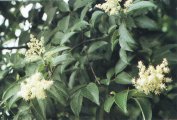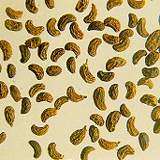Glossy Privet Fruit
http://www.100md.com
《e Natural Health Center》
 |
 |
 |
Yin Tonics
Glossy Privet Fruit
Latin:
Fructus Ligustri Lucidi
Origin:
The dried mature fruit of the plant Ligustrum lucidum W.T.Aiton., of the family Oleaceae. Native to east Asia, the plant is grown on roadsides and in river valleys in China, Malaysia, and other Southeast Asian countries. Other species (about 40 to 50 species) of the genus Ligustrum are native to Europe, Asia, Australia, and the Mediterranean region. Privets are widely used for hedges, screens, and ornamental plantings in most countries, while the fruit of glossy privet is a valued yin tonic in traditional Chinese medicine.
, 百拇医药
The evergreen shrub grows to about 10 m by 3 m at a medium rate. The plant is with opposite, usually oval, smooth-margined leaves; creamy-white, often odorous, terminal clusters of flowers; and one- to four-seeded black berries. The flower clusters reach 25 cm in summer. It is in leaf all year, in flower from August to September, and the seeds ripen from September to October. The flowers are hermaphrodite (have both male and female organs) and are pollinated by insects. The plant can grow in full shade (deep woodland), semi-shade (light woodland) or no shade. It requires moist soil. It can tolerate atmospheric pollution.
, 百拇医药
Glossy privet is grown everywhere in China. The fruit is collected in winter when the fruit is mature and dried in the sun, or slightly steamed or slightly scaled with boiling water and dried. The herb is used unprepared.
Also called Chinese Privet Fruit.
Properties:
Sweet and bitter in flavor, cool in nature, it is related to the liver and kidney channels.
, http://www.100md.com
Functions:
Tonifys yin, nourishes the kidney and liver and improves vision.
Glossy privet fruit has been used in traditional Chinese medicine for over 1,000 years.
Applications:
1. To treat yin deficiency of the liver and kidney with symptoms of aching and weakness of the waist and knees, dizziness, tinnitus, premature greying hair, and weak or blurred vision, the herb is often used in combination with chrysanthemum flower, wolfberry fruit, eclipta, dodder seed and other herbs for nourishing the kidney and liver, tonifying yin and improving vision
, 百拇医药
2. To treat fever due to yin deficiency, night sweat and spermatorrhea, the herb can be used in combination with dried rehmannia root, dogwood fruit, anemarrhena rhizome, scrophularia root, wolfberry fruit and other herbs for tonifying yin and clearing heat of deficiency type.
Dosage and Administration:
10-15 g.
Decoction.
Cautions on Use:
, 百拇医药
Glossy privet fruit is mildy toxic. Some caution is advised in its use, since the fruit is toxic when eaten in quantity.
Although no other reports of toxicity have been seen for this species, it is quite probable that other parts of the plant also contain toxins.
Reference Materials:
Toxic or Side Effects:
Glossy privet fruit is mildy toxic.
, http://www.100md.com
Modern Researches:
Glossy privet fruit is taken internally in the treatment of complaints associated with weak kidney and liver energy such as menopausal problems (especially premature menopause), blurred vision, cataracts, tinnitus, rheumatic pains, palpitations, backache and insomnia.
Modern research has shown that the plant increases the white blood cell count and is of value when used to prevent bone marrow loss in cancer chemotherapy patients. The herb has the effect of increasing white blood cells on leukopenia caused by chemical and radioactive therapies. It can promote genesis of lympho blasts in the healthy human body, increase peripheral leukocytes, enhance the phagocytosis of the reticuloendothelial system and enhance humoral and celiular immuning.
, http://www.100md.com
Its 100% decoction precipitated with alcohol can increase the blood flow in isolated coronary arteries and has cardiotoinc, anti-cancer and diuretic effects. Extracts of the plant show antitumour activity.
Good results have also been achieved when the fruit has been used in treating respiratory tract infections, hypertension, Parkinson's disease and hepatitis.
It also has potential in the treatment of AIDS.
The leaves are anodyne (relieves pain), diaphoretic (increases perspiration), febrifuge, pectoral and vulnerary (heals wounds).
The bark of the stems is diaphoretic., http://www.100md.com